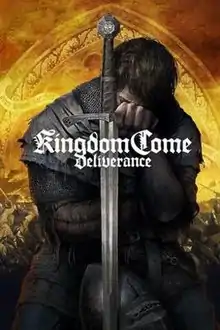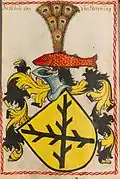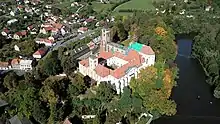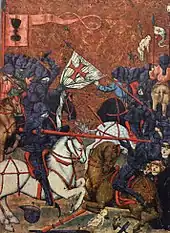Kingdom Come: Deliverance
Kingdom Come: Deliverance is a 2018 action role-playing video game developed by Warhorse Studios and published by Deep Silver for Microsoft Windows, PlayStation 4, and Xbox One. It is set in the medieval Kingdom of Bohemia, an Imperial State of the Holy Roman Empire, with a focus on historically accurate content.[1]
| Kingdom Come: Deliverance | |
|---|---|
 | |
| Developer(s) | Warhorse Studios |
| Publisher(s) |
|
| Director(s) | Daniel Vávra |
| Producer(s) |
|
| Designer(s) | Viktor Bocan |
| Programmer(s) | Tomáš Blaho |
| Artist(s) | Mikuláš Podprocký |
| Writer(s) | Daniel Vávra |
| Composer(s) |
|
| Engine | CryEngine |
| Platform(s) | |
| Release | 13 February 2018 |
| Genre(s) | Action role-playing |
| Mode(s) | Single-player |
The story takes place during a war in Bohemia in 1403. On the orders of Hungarian king Sigismund, Cuman mercenaries raid the mining village of Skalitz, a major source of silver. One of the survivors of the resulting massacre is Henry, the son of a blacksmith. Destitute and vengeful, Henry joins the service of Lord Radzig Kobyla, who leads a resistance movement against Sigismund's invasion. As Henry pursues justice for his murdered family, he becomes involved in an effort to restore Bohemia's rightful king and Sigismund's half-brother, Wenceslaus IV, to the throne. The game features branching quest lines, an open world environment, and period-accurate weapons, clothing, combat techniques, and architecture (recreated with the assistance of architects and historians), which encourages immersive gameplay.
The game received generally positive reviews and a number of Game of the Year awards. Critics praised the story, attention to detail, and focus on realism, while criticism was aimed at technical bugs.
Gameplay
Kingdom Come: Deliverance is an action role-playing game set in an open-world environment and played from a first-person perspective. It utilizes a classless role-playing system, allowing the player to customize their skills to take on roles such as warrior, bard, thief, or a hybrid of these. Abilities and stats grow depending on what the player does and says through branched dialogue trees. During conversations, the time a player takes to make a decision is limited and has an effect on their relationships with others. Reputation is based on player choices and therefore can bring consequences.[2]
Character bodies and faces are created through the combination of multiple, individual pieces with finishing touches. The clothing system features 16 item slots and items on many areas of the body that can be layered.[1] For example, a heavily armored knight may on his upper body wear a gambeson, followed by mail and plate armour, with a tabard or surcoat over top, for a total of four clothing items in the chest slots. Each clothing type provides different levels of protection against different types of weapons. Clothing also gets progressively more worn, dirty, or bloody through use, affecting the character's appearance. The player is able to use a variety of weapons, including swords, knives, axes, hammers, and bows.[3] Horses are featured heavily in the game, and are designed to act with their own AI while under the player's control, moving or jumping to avoid small obstacles or dangers. The player can also fight from horseback and use their steed to carry items if they need additional inventory space, but warhorses are also competent combatants with their own AI. Steeds come with five slots for armor and attachments.
Kingdom Come: Deliverance also features a needs system which requires the player to sleep and eat in order to stay healthy. Equipment and clothing also degrade and require repair. Foodstuffs and other perishable items will spoil over time. The game uses skill/stat-based mini-games for many of these tasks, including weapon and armor repair, as well as for gathering new items by picking locks or pockets, distilling alcohol, or creating medicines. The game uses long- and short-ranged weapons in combat which is based on a physics system using inverse kinematics to determine the reactions of both combatants based on the speed and weight of a blow. This system aims to add greater variety and realism to the combat, coupled with a variety of basic combat moves and combination moves, some of which can be unlocked by skill points. Different weapons have different characteristics, making them useful for different purposes.[3] For example, a sword is a quick weapon for striking and parrying, but is not very effective against heavy armor.
Quests are intended to be nonlinear, with multiple ways to complete objectives to allow multiple character types to be viable.[4] The storyline features some large-scale events such as castle sieges and large battles. Every non-player character (NPC) has a daily routine, and every routine can be affected by the player.[1] Characters are able to react to all player actions and adjust their routines to them.[5] NPCs will report crimes to authorities, who will punish the player accordingly, either with a fine or time in jail. Crime will affect economics and people will get suspicious or aggressive after unresolved crimes.
Synopsis


Setting


Kingdom Come: Deliverance takes place in the early 15th century, in the Kingdom of Bohemia, part of the Bohemian Crown and the Holy Roman Empire in what is now the Czech Republic. The accessible area of the game is located in the region between Sasau and Rattay.[1] Other real-world settlements and towns in the game include Ledečko, Mrchojedy, Přibyslavice, Samopše, Sázava Monastery, Stříbrná Skalice, Talmberk, Úžice, and Vraník.[6][7]
Before the events of the game, the Kingdom of Bohemia was ruled by Charles IV, Holy Roman Emperor, and it experienced a golden age under his reign. After Charles' death, his son, Wenceslaus IV of Bohemia, took up the throne instead of his half-brother, Sigismund, King of Hungary and Croatia. Wenceslaus would prove himself to be an idle and useless ruler, and a nuisance to the Bohemian nobility who could not control him. In a daring move, with the help of the Bohemian nobles, Sigismund kidnaps Wenceslaus and begins a brutal campaign to pillage the Bohemian lands.
Plot
In the silver mining town of Skalitz, young Henry is a simple apprentice living with his mother and his blacksmith father, Martin. Henry and Martin are putting the finishing touches on a commissioned sword for King Wenceslaus' hetman, Sir Radzig Kobyla, when Skalitz is attacked by an army of Cuman soldiers under Sigismund's command. Sigismund's adjutant, Sir Markvart von Aulitz, kills Henry's parents as Henry flees to the nearest castle of Talmberg to warn its lord, Sir Divish, of the attack. Taking advantage of a storm, Sir Radzig sneaks the Skalitz survivors out and leads them to Rattay. Meanwhile, Henry is devastated that his parents have not been properly buried, and sneaks back to Skalitz against Divish's orders. Henry is then confronted by a group of bandits; their leader, Runt, defeats him in a duel and steals the commissioned sword. Henry's life is saved by another Skalitz survivor, Theresa, and Talmberg's Captain Robard, who take him to Rattay.
Seeking to recover his father's sword and avenge his parents, Henry meets Sir Hanush of Leipa, acting Lord of Rattay and guardian to his young nephew, Lord Hans Capon. After saving Capon from a group of Cumans, Henry becomes Sir Radzig's envoy. Henry then investigates a bandit raid on a local stud farm, and eventually discovers a concealed camp housing both bandits and Cumans—Runt being among them. Henry attacks and overwhelms the camp with Radzig's and Divish's soldiers. He then kills Runt, but fails to locate the commissioned sword.
The hybrid camp leads the Lords to believe that someone is secretly raising an insurgency. Henry follows various leads to discover a group of bandits operating near Sasau, and successfully infiltrates their ranks. He is led to the bandits' stronghold in Vranik, finding a massive hidden army composed of Czech mercenary soldiers. There he runs into Istvan Toth, a Hungarian nobleman who was visiting Skalitz the day of the attack. Toth recognizes Henry and has him captured and tortured. Toth reveals that he wields Henry's father's sword and plans to use his mercenaries to conquer Bohemian lands, expecting Sigismund to reward him once he reigns as king. He also reveals that Henry is actually Sir Radzig's illegitimate son.
With the help of a former Skalitz villager, Zbyshek, Henry escapes and warns the Lords of Toth's treachery. Radzig acknowledges Henry as his son, but keeps focus on the burgeoning situation. The Lords and their combined army assemble at Vranik and assault the stronghold, defeating its garrison. However, Toth and a large number of his mercenaries have infiltrated Talmberg and captured its castle, taking Divish's wife Stephanie and Sir Radzig as hostages. The Lords are forced to lay siege on Talmberg.
Sir Divish has Henry recruit Konrad Kyeser and commands the building of a trebuchet, which they use to breach the castle's walls. The Lords enter Talmberg, overwhelm Toth's soldiers, and Sir Hanush negotiates the release of the hostages in exchange for Toth's safe departure—much to Henry's dismay. Henry and Radzig ponder the outcome of the situation: Henry is disheartened by Toth and von Aulitz's escape from justice, while Radzig weighs that the lives saved at the end were due to Henry and the Lords honouring their nobility and moral principles. Radzig also reveals that he and his mother were lovers when they were young, but could not marry due to their different social classes, which was why he allowed Martin to be Henry's father.
In the epilogue, Henry is visited by Martin in a dream, who commends Henry for his courage and perseverance before walking away with Henry's mother into the afterlife. Henry awakens in Rattay, embracing his new life as a nobleman's son. The Bohemian Lords are then visited by Jobst, the Margrave of Moravia and King Wenceslaus' cousin, who has negotiated an alliance with various nobles throughout the empire against Sigismund. He wishes to have the Bohemian Lords join, hoping that this alliance will sway Sigismund's supporters into suing for peace; Sigismund's victory is uncertain, especially since the war has resulted in an uprising against him back in Hungary.
The Lords are uncertain of this plan, but agree that Wenceslaus must be restored to the throne. To assess the situation, Henry and Capon depart on a journey to visit one of Sigismund's allies, Otto von Bergow, at his estate in Trosky Castle, with a letter enquiring whether or not his allegiance to Sigismund has been shaken. Henry remarks that his personal quest remains to kill von Aulitz and recover his father's sword.
Development and release
The project that was to become Kingdom Come: Deliverance began with a pitch by Daniel Vávra, who had left 2K Czech in 2009. With a small team he began seeking investors for the project. Vávra's pitch brought on board Martin Klíma, founder of Altar Games, but pitches to major investors in the Czech Republic were not successful. The team was preparing to abandon the project when a successful pitch to a private investor, the Czech billionaire Zdeněk Bakala, secured funding to develop a prototype of the game. Warhorse Studios was founded on 21 July 2011.[8]
Warhorse Studios first announced that they were working on an "unannounced role-playing game" on 9 February 2012, having successfully licensed CryEngine 3 on this date.[9] After seventeen months working on the prototype, Warhorse began a tour pitching the prototype to various international investors. The project did not generate the hype they had hoped for and, with dwindling resources, little progress was made towards an investment.[10]
On 22 January 2014, Warhorse Studios launched a crowdfunding campaign via Kickstarter with the goal of generating £300,000, ten percent of the US$5,000,000 budget, in order to prove to investors that there was an audience and desire for the game. By 20 February, the effort had raised a total of £1,106,371.[11] Even after the end of the Kickstarter campaign, crowdfunding was continued through the studio's website. On 1 October 2014, Daniel Vávra announced through a YouTube video that the game had raised US$2,002,547 from a total of 38,784 backers. The date of the public alpha access launch was on 22 October 2014. The beta was released for backers on 3 March 2015. On 29 September 2016, it was announced that Warhorse Studios had signed a deal with Koch Media's game publishing division Deep Silver to publish the console versions as well as the retail PC version.[12] The game's adaptive music soundtrack[13] was composed by Jan Valta and Adam Sporka,[14] and its parts were recorded with a symphonic orchestra in Rudolfinum.[15]
The game was released worldwide on 13 February 2018. A day-one patch was released with an extensive update of the game code and gameplay.[16] Vávra stated the game cost them 750 million crowns, approximately $36.5 million USD, including marketing costs.[17]
On 27 May 2018, the developers revealed a DLC roadmap.[18] From the Ashes is the first DLC and grants the player control over an abandoned village that needs to be rebuilt. Two more story DLCs—The Amorous Adventures of Bold Sir Hans Capon and Band of Bastards—were released before the end of 2018. Other new content includes combat tournaments, a "making of" documentary, and "Combat Academy" videos. The fourth story DLC, A Woman's Lot, arrived in early 2019, with modding support scheduled to arrive at a later date. A Woman's Lot is a free expansion for early crowdfunding supporters. A "Royal Edition", which includes the base game and all additional content, was released in June 2019.[19]
Reception
| Aggregator | Score |
|---|---|
| Metacritic | (PC) 76/100[20] (PS4) 69/100[21] (XONE) 68/100[22] |
| Publication | Score |
|---|---|
| Destructoid | 7.5/10[23] |
| EGM | 3.5/10[24] |
| Game Informer | 5.75/10[25] |
| GameRevolution | |
| GameSpot | 8/10[27] |
| IGN | 8/10[28] |
| PC Gamer (UK) | 84/100[29] |
| VideoGamer.com | 4/10[30] |
Kingdom Come: Deliverance received "generally favorable" reviews from critics for the PC version, while the PlayStation 4 and Xbox One versions received "mixed or average" reviews, according to review aggregator Metacritic.[20][21][22]
EGM criticized the game's difficult-to-use save system, long loading times, and frequency of software bugs, complaining that they had logged 30 hours of real-time play but that only 19 hours had actually been spent advancing the game because of this, concluding that "What could have been an intriguing, unique, if somewhat underwhelming RPG is completely crippled by a terrible save system and game-breaking bugs."[24] Game Informer similarly criticized the save system and software bugs, concluding that "If the historical setting and focus on realism appeal to you, then the deep gameplay systems and methodical pace are worth learning. ...however, the countless technical issues Kingdom Come requires you to suffer...until the developer brews up a comprehensive salve of patches and polish, you should avoid Henry's adventure like the plague."[25]
Game Revolution was more positive of the experience, describing the game as "if you stripped Skyrim of the fantastical creatures and magic", and concluding that "it made for good enough of an experience to warrant enduring the game's bugs and shortfalls."[26] GameSpot identified the game's attention to small detail as both a positive and negative point in the game, praising the "Incredible attention to historical detail" and "Extensive, lifelike quests", but criticizing that "Overly rigorous core mechanics can get in the way of your enjoyment".[27] IGN praised the game for its story, characters, and combat system, while criticizing its lack of technical polish.[28] Digitally Downloaded appreciated the game's attention to detail, but criticized the "juvenile" tone the game takes in some of its traits, such as "manly odor" being a stat booster, receiving an alpha male stat boost by visiting a brothel, or needing to consume alcoholic drinks in order to save progress.[31]
Outlets such as Kotaku noted that there seemed to be more glitches and software bugs on the Xbox version of the game, and that the update patches were solving less of the errors than they were on other platforms.[32]
The game reached a peak concurrent player count on Steam of 95,863 players at once, surpassing both The Witcher 3: Wild Hunt and The Elder Scrolls V: Skyrim, which recorded 92,268 and 90,780 all-time peak players respectively.[33]
Controversy
Some publications and websites accused the developers of "whitewashing" for not portraying people of color in the game, and for the game's portrayal of Cumans and Hungarians as cruel invaders.[34] The developers responded by claiming that the game is historically accurate and that people of color did not inhabit early 15th-century Bohemia in significant numbers.[35]
European media also responded to some aspects of the criticism. A commentator at the Czech newspaper Lidové noviny called the accusations "out of place" and claimed that most Europeans would respond that there were very few, if any, black people in early 15th-century central Bohemia.[36] To evaluate if non-white people lived in 15th-century Bohemia, the German magazine M! Games asked scholars at the Johannes Gutenberg University Mainz. According to them, there were at most Turkic peoples, like Cumans (who appear in the game as enemies), but otherwise the presence of non-whites is "questionable".[37]
Some of these publications also reproached the views held by the game's director Daniel Vávra, who has been a vocal critic of what he believes is a progressive bias in video game journalism. Vávra associates his views on video game journalism with #GamerGate.[38][39] Daniel Vávra and Martin Klíma responded to the accusations in an interview, stating that Vávra might be a little "quick with words", apologizing for anyone who felt offended.[35]
Sales
On release day, the game topped the Steam top-sellers list.[40] Game director Daniel Vávra stated that the game sold 500,000 copies during its first two days,[41][42] of which 300,000 were on Steam.[43] Within two weeks of release, the game sold over a million copies in total across all platforms.[44] A year after its release the game had sold over 2 million copies.[45] In June 2020, Warhorse announced that 3 million copies had been sold, with 1.5 million copies of additional DLCs.[46]
The PlayStation 4 version of Kingdom Come: Deliverance sold 13,058 copies within its first week on sale in Japan, which placed it at number four on the all-format sales chart.[47]
Accolades
Before release, the game was nominated at the 2017 Game Critics Awards and gamescom events for "Best RPG", winning the award for "Best PC Game" at the latter.[48][49][50] In 2018, the game was also nominated for "PC Game of the Year" at the 2018 Golden Joystick Awards.[51] The authors of the soundtrack received "Special Achievement in Multimedia Award" at the 2nd International Festival of Film Music and Multimedia Soundtrack in Poděbrady.[52][53] The game was nominated at the 1st Central & Eastern European Game Awards for "Best Game" and "Technology", winning the award for "Narrative".[54]
| List of awards and nominations for Kingdom Come: Deliverance | |||||||||||||||||||||||||||||||||||||||||||||||||||||||||||||||||||||||||||||||||||||||||||
|---|---|---|---|---|---|---|---|---|---|---|---|---|---|---|---|---|---|---|---|---|---|---|---|---|---|---|---|---|---|---|---|---|---|---|---|---|---|---|---|---|---|---|---|---|---|---|---|---|---|---|---|---|---|---|---|---|---|---|---|---|---|---|---|---|---|---|---|---|---|---|---|---|---|---|---|---|---|---|---|---|---|---|---|---|---|---|---|---|---|---|---|
|
See also
Notes
- Deep Silver published the PlayStation 4 and Xbox One versions for physical and digital releases, as well as the Microsoft Windows version for physical release. Warhorse Studios published the Microsoft Windows version for digital release.
- The Czech noble family of House of Pirkstein (cs) is a sub-branch of the prominent House of Leipa (cs). Their coat of arms is identical to the coat of arms of the House of Lichtenburg (cs) (displayed).
References
- "Kingdom Come: Deliverance is an RPG that trades fantasy for historical accuracy". The Verge. Archived from the original on 4 February 2018. Retrieved 5 February 2018.
- "Kingdom Come: Deliverance brings Skyrim crashing down to medieval reality". PCGamesN. Archived from the original on 6 March 2018. Retrieved 5 February 2018.
- "Here's how combat works in Kingdom Come: Deliverance". PCGamesN. Archived from the original on 6 March 2018. Retrieved 5 February 2018.
- Palumbo, Alessio (11 January 2018). "Warhorse: Kingdom Come Deliverance Is A Very Unique Experience That Ignores Many Established RPG Tropes". Wccftech. Archived from the original on 24 January 2018. Retrieved 5 February 2018.
- "E3 2015: Interview with Daniel Vávra on Kingdom Come: Deliverance". APGNation - Gaming News & eSports 2017. 17 June 2015. Archived from the original on 24 October 2016. Retrieved 5 February 2018.
- "Mapa". Kingdom Come: Deliverance (in Czech). 1 September 2014. Archived from the original on 9 August 2017. Retrieved 5 February 2018.
- "Kingdom Come Deliverance Map - Interactive map for Kingdom Come Deliverance". kingdomcomemap.github.io. Retrieved 9 May 2020.
- "Czech Veterans Form New Studio, Warhorse". Rock, Paper, Shotgun. 26 July 2011. Archived from the original on 29 September 2017. Retrieved 4 February 2018.
- "Warhorse Studios Licensed CRYENGINE® to Develop RPG". CryEngine. Crytek. 9 February 2012. Archived from the original on 27 October 2016.
- "The Art of Waiting | Kingdom Come RPG". Archived from the original on 25 March 2014. Retrieved 4 February 2018.
- Tach, Dave (21 February 2014). "Kingdom Come: Deliverance funded after two uncertain years". Polygon. Vox Media. Archived from the original on 10 October 2016.
- Makuch, Eddie (29 September 2016). "Medieval RPG "Kingdom Come" Signs Publishing Deal With Dead Island Studio". GameSpot. CBS Interactive. Archived from the original on 2 October 2016. Retrieved 30 September 2016.
- Sporka, Adam; Valta, Jan (December 2017). "Design and implementation of a non-linear symphonic soundtrack of a video game". New Review of Hypermedia and Multimedia. 23 (4): 229–246. doi:10.1080/13614568.2017.1416682.
- "Kingdom Come: Deliverance Original Soundtrack". Retrieved 31 December 2018.
- Check out how Kingdom Come: Deliverance's music is made Archived 6 March 2018 at the Wayback Machine. Gamereactor. 7 December 2017.
- Murnane, Kevin. "Here's The Story Behind 'Kingdom Come: Deliverance's 23 GB Day-One Patch". Forbes. Archived from the original on 20 February 2018. Retrieved 16 February 2018.
- Palumbo, Alessio (4 March 2018). "Kingdom Come: Deliverance Reportedly Cost 36.5 Million Dollars". Wccftech. Retrieved 12 April 2018.
- Horti, Samuel (27 May 2018). "Kingdom Come: Deliverance unveils DLC roadmap, three new stories due this year". PC Gamer. Retrieved 30 August 2018.
- Chalk, Andy (9 May 2019). "The next Kingdom Come: Deliverance DLC will let you play as a woman". PC Gamer. Retrieved 14 July 2019.
- "Kingdom Come: Deliverance for PC Reviews". Metacritic. Archived from the original on 19 September 2017. Retrieved 14 February 2018.
- "Kingdom Come: Deliverance for PlayStation 4 Reviews". Metacritic. Archived from the original on 19 July 2017. Retrieved 22 February 2018.
- "Kingdom Come: Deliverance for Xbox One Reviews". Metacritic. Archived from the original on 1 July 2017. Retrieved 22 February 2018.
- Roemer, Dan (20 February 2018). "Review: Kingdom Come: Deliverance". Destructoid. Archived from the original on 6 March 2018. Retrieved 23 February 2018.
- Goroff, Michael (21 February 2018). "Kingdom Come: Deliverance review". Electronic Gaming Monthly. Archived from the original on 6 March 2018. Retrieved 21 February 2018.
- Marchiafava, Jeff (28 February 2018). "A Noble Quest In Need Of Divine Intervention - Kingdom Come: Deliverance - Xbox One". Game Informer. Archived from the original on 1 March 2018. Retrieved 1 March 2018.
- Faulkner, Jason (13 February 2018). "Kingdom Come: Deliverance Review - Hardcore Henry". Game Revolution. Archived from the original on 13 February 2018. Retrieved 13 February 2018.
- Todd, Brett (20 February 2018). "Kingdom Come: Deliverance Review: The Past Comes At You Fast". GameSpot. Archived from the original on 22 February 2018. Retrieved 20 February 2018.
- Hafer, TJ (16 February 2018). "Kingdom Come: Deliverance Review". IGN. Archived from the original on 17 February 2018. Retrieved 16 February 2018.
- Kelly, Andy (14 February 2018). "Kingdom Come: Deliverance review". PC Gamer. Archived from the original on 14 February 2018. Retrieved 14 February 2018.
- Bell, Alice (20 February 2018). "Kingdom Come: Deliverance review". VideoGamer.com. Archived from the original on 6 March 2018. Retrieved 20 February 2018.
- S, Matt. "Review: Kingdom Come: Deliverance (Sony PlayStation 4)". www.digitallydownloaded.net. Retrieved 8 March 2018.
- Gach, Ethan. "Kingdom Come: Deliverance's Xbox Patches Are A Mess [UPDATE]". Kotaku. Retrieved 8 March 2018.
- "Kingdom Come Beats The Witcher 3's Highest CCU Peak on Steam". GameRevolution. 19 February 2018. Retrieved 28 May 2018.
- McCarter, Reid (2 March 2018). "Deliverance: Myth-making and Historical Accuracy". Unwinnable. Archived from the original on 3 March 2018. Retrieved 4 March 2018.
- GmeStar staff. Seite 3: Kingdom Come: Deliverance - Die Reaktion auf die Rassismus-Vorwürfe (in German). GameStar. 17.01.2018.
- "Proč nejsou ve středověké hře z Čech žádní černoši? ptají se v zámoří" [Why there are no black people in the medieval game from Bohemia? they ask overseas]. Lidovky.cz. Lidové noviny. MAFRA. 3 March 2014. Archived from the original on 25 July 2017. Retrieved 5 March 2018.
- M! Games, Issue 294, March 2018, Page 51
- "Vavra reacts to accusations of racism". Gamestar.de. 17 January 2018. Retrieved 28 April 2018.
- "An interview with Daniel Vavra: GamerGate and the gaming industry". techraptor.net. 12 September 2014. Retrieved 12 February 2018.
- Hall, Charlie (12 February 2018). "Kingdom Come: Deliverance is getting a massive day-one patch (update)". Polygon. Archived from the original on 12 February 2018. Retrieved 13 February 2018.
- "90' ČT24: Česko: velmoc počítačových her?". Česká televize (in Czech). p. 21:30. Archived from the original on 15 February 2018. Retrieved 14 February 2018.
- Arif, Shabana (15 February 2018). "Kingdom Come: Deliverance Has Sold Around Half a Million Copies". IGN. Archived from the original on 16 February 2018. Retrieved 16 February 2018.
- "Kingdom Come: Deliverance is nearly profitable only two days after release". VentureBeat. 15 February 2018. Archived from the original on 18 February 2018. Retrieved 27 February 2018.
- Saed, Sherif (22 February 2018). "Kingdom Come Deliverance has sold 1 million copies". VG24/7. Archived from the original on 22 February 2018. Retrieved 23 February 2018.
- Bigas, Jiří. "THQ Nordic kupují autory Kingdom Come". www.vortex.cz. Vortex.cz. Retrieved 13 February 2019.
- "Kingdom Come: Deliverance has sold 3m copies". GamesIndustry.biz. Retrieved 23 July 2020.
- Romano, Sal (24 July 2019). "Famitsu Sales: 7/15/19 – 7/21/19 [Update]". Gematsu. Retrieved 3 August 2019.
- "Game Critics Awards: Best of E3 2017 (2017 Nominees)". Game Critics Awards. Archived from the original on 4 July 2010. Retrieved 23 January 2018.
- Khan, Zubi (21 August 2017). "Gamescom 2017 Award Nominees". CGM. Archived from the original on 20 January 2018. Retrieved 23 January 2018.
- "Super Mario Odyssey sweeps Best Of Gamescom awards". Metro. 24 August 2017. Archived from the original on 27 August 2017. Retrieved 23 January 2018.
- Hoggins, Tom (24 September 2018). "Golden Joysticks 2018 nominees announced, voting open now". The Daily Telegraph. Retrieved 7 October 2018.
- "Soundtrack 2018 Aftermovie". 7 October 2018.
- "Soundtrack, den čtvrtý: festival završil koncert hudby k české herní senzaci Kingdom Come: Deliverance". 3 September 2018.
- Ricchiuto, Madeline (13 October 2018). "Frostpunk Cleans Up at First Annual CEEGA Awards". Bleeding Cool. Retrieved 17 October 2018.
- "MundoBSO Premios". MundoBSO. Retrieved 31 December 2018.
- Glyer, Mike (19 November 2018). "2018 Gamers' Choice Awards Nominees". File 770. Retrieved 15 January 2019.
- "Titanium Awards 2018". Fun & Serious Game Festival. 10 December 2018. Archived from the original on 7 July 2019. Retrieved 7 November 2019.
- "Your 2018 Winners". Australian Games Awards. 19 December 2018. Retrieved 15 January 2019.
- "Pozrite si výsledky ankety Ceny Hráčů za rok 2018". CzechGamer.cz (in Czech). 19 March 2019. Retrieved 30 March 2019.